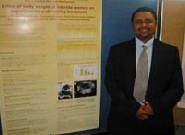Students from as far afield as Libya, Sudan and China have become the first part-time candidates to complete Bristol University’s new postgraduate Masters course in human reproduction and fetal development.
The course, introduced in 2001 by the University’s Division of Obstetrics and Gynaecology, uses novel Internet-based distance learning technologies to reach its students, 48 per cent of whom are based outside the UK.
The course caters for both full time (1 year) and part time (2 years) students. All the part-time students are employed, full time, in clinical or scientific posts, illustrating the importance of distance learning methods in widening the participation of such groups in postgraduate education. As well as Internet-based learning, the students also attend short residential workshops in Bristol, totalling no more than 10 weeks.
Elasamwal Elhakim, one of the M.Sc students, said: “The course was fantastic – I managed to do it while working in my home country Sudan at a very low cost compared to other courses where you need to stay on campus.
“The Internet teaching worked very well in my home country. Connection to the University server, scientific data, and electronic journals was very easy and well supported by the University’s IT department in case I needed any technical advice. I successfully managed to access and download all the lectures and practicals, and submit all of my home tasks.
“I would strongly recommend this course to anyone hoping to enjoy a career in reproductive medicine, embryology, and andrology. The course is interactive, and having students from different scientific and cultural backgrounds was one of the best aspects of this course.”
